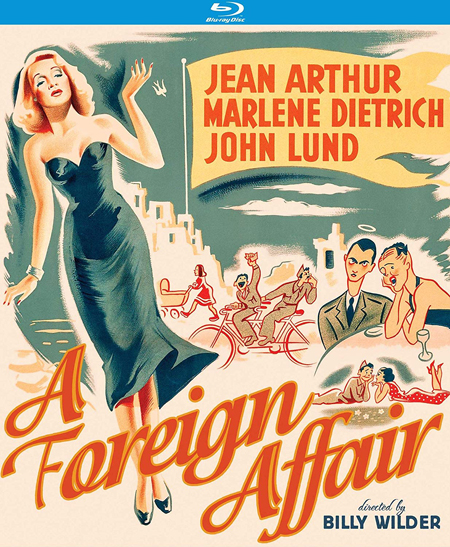
“MARLENE
VS. JEANâ€
BY RAYMOND BENSON
Not
usually mentioned in naming off the many classic movies made by master
filmmaker Billy Wilder, A Foreign Affair seems to always be lumped in
with his lesser efforts. This is a mistake.
After
the one-two punch of Double Indemnity (1944) and The Lost Weekend
(1945), the latter picture winning Best Picture and Director, Wilder made The
Emperor Waltz (1948), which truly is a bit of a dud, and then A Foreign
Affair, released that same year.
The
film featured the fabulous comic actress Jean Arthur in her last motion picture
starring role (she would appear in a supporting part a few years later in Shane,
her last movie, but would continue to work in theatre and television), and the
marvelous Marlene Dietrich, whose star had diminished somewhat by the late 1940s
but was still a screen presence to reckon with. The third corner of the ménage à trois that is the center of
the picture is John Lund, a leading man wannabe who never quite broke through
after a couple dozen near misses.
Post-war
Berlin (where a lot of the film was shot) is still in devastation, policed in
four quarters by the Allies. The German people are struggling to rebuild their
lives and spirits. A Congressional committee comes to the U.S. sector to visit
a military base and assess the morale and progress of the troops. Congresswoman
Phoebe Frost (Arthur) from Iowa is one of the more patriotic, prim, and proper
members of the team. Handsome and charming Captain John Pringle (Lund) is
having an affair with German cabaret singer Erika von Schlütow
(Dietrich), but the army suspects her of harboring a Nazi war criminal who was
once her lover. Frost snags Pringle to unwittingly be her partner in smoking
out von Schlütow and in the process falls in love with
him. Pringle pretends to be smitten as well to keep Frost from learning of his
relationship with von Schlütow. It all becomes a
comedy—and musical—of manners set amidst rather serious, sober times for a
country fighting to survive.
Like
with most Wilder pictures, the humor conflicts with the drama in unsuspecting
ways. This is a comedy with bite.
Poor
Lund fades into the background compared to the dynamo star power of Arthur and
Dietrich, as they battle each other for not only Lund’s affections, but for the
audience’s as well. Arthur, who was in her late forties at the time (sadly
considered “old†by Hollywood standards in those days), is as charming and
funny as ever. Dietrich, who was a year younger, never seems to age. Her
cabaret act recalls her numbers in the early Josef von Sternberg vehicles like The
Blue Angel and Morocco. As she is essentially the villain in the
story, it’s noteworthy that Wilder was able to persuade Dietrich to play a
member of the party she openly despised. The two women are fascinating to
watch.
Kino
Lorber presents a 1920x1080p high definition transfer that is of mixed quality.
Portions of the feature look pristine and sharp—albeit with the requisite and
welcome graininess one would expect from a black and white feature from the
period. Other sections of the movie, however, contain artifacts and vertical
lines that hover for several minutes. Still, it’s nice to have this Wilder
rarity on Blu-ray, and it comes with an interesting audio commentary by film
historian Joseph McBride. There are no supplements other than the theatrical
trailer and other Kino Lorber trailers.
Fans
of Billy Wilder, Jean Arthur, and/or Marlene Dietrich will surely get a kick
out of this time capsule that captures post-war Germany with a good deal of insight
and quite a few laughs.
CLICK HERE TO ORDER FROM AMAZON